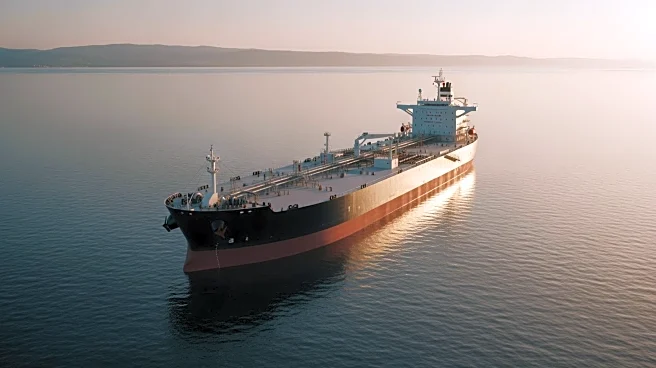What's Happening?
The Iranian Revolutionary Guard's navy seized a tanker named Talara in the Gulf of Oman, marking the first such incident in several months. The vessel, flagged to the Marshall Islands, was carrying 30,000
tons of petrochemical materials bound for Singapore, which Iran deemed 'unauthorized cargo.' The seizure was reportedly carried out to protect Iran's interests and resources, following orders from Iranian judicial authorities. The tanker deviated from its course towards Iranian territorial waters after small boats approached it. A U.S. official confirmed the seizure, while Columbia Shipmanagement, the operator of the vessel, lost contact with the tanker. The incident occurred approximately 40 kilometers off the UAE coast, and the UK Maritime Trade Operations agency issued an alert suggesting state activity influenced the tanker’s course.
Why It's Important?
This seizure highlights ongoing maritime tensions in the region, particularly between Iran and Western or Gulf countries. Such incidents can exacerbate geopolitical conflicts and impact global oil and petrochemical supply chains. The seizure comes amid heightened volatility in the Red Sea and surrounding maritime zones following recent conflicts involving Hamas and Israel. The targeting of vessels by Iran and retaliatory actions by other nations could lead to increased security risks for international shipping routes, affecting global trade and economic stability.
What's Next?
The incident may prompt diplomatic responses from affected nations, including the United States and UAE, potentially leading to increased naval patrols or security measures in the region. The situation could also influence ongoing negotiations or discussions regarding maritime security and trade agreements. Stakeholders in the shipping industry may need to reassess risk management strategies and insurance policies to mitigate potential disruptions.
Beyond the Headlines
The seizure reflects broader geopolitical strategies employed by Iran to leverage maritime control as a tool against perceived adversaries. It underscores the complex interplay of regional politics, where maritime actions serve as both a strategic and symbolic assertion of power. The incident may also influence future diplomatic engagements and negotiations concerning regional security and trade.










